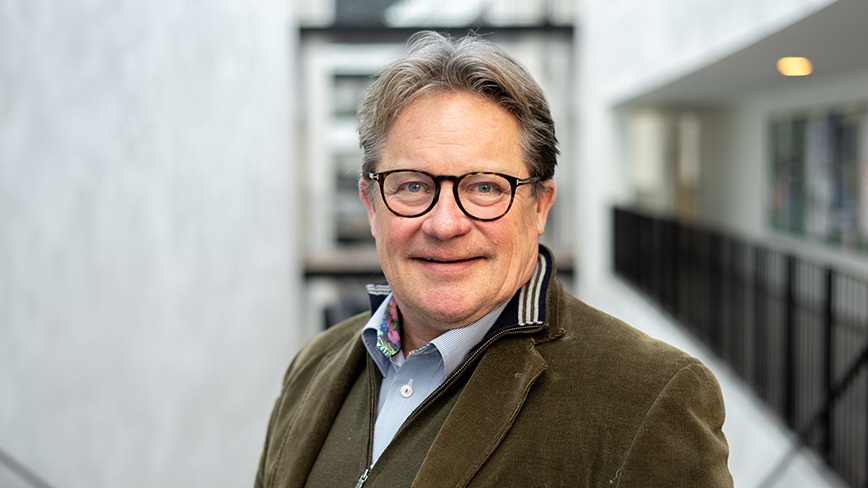Stefan Ståhl inspires both students and teachers: "It's terribly fun!"

For more than ten years, Stefan Ståhl has been inspiring high school students to study biotechnology – and he hasn't gotten tired of it yet. His own research involves targeting drugs with the aim of curing diseases such as cancer and dementia. Grateful subjects to lecture on, he says. Now he hopes that a new generation of researchers will want to take over.
On a rainy Friday morning in February, Stefan Ståhl meets 10 students from Täby Enskilda gymnasium and their teachers at the reception of SciLifeLab in Solna. The students are in their final year of the Nature Programme with a specialisation in biotechnology.
The ten high school students in the small meeting room at SciLifeLab listen attentively and ask – to Stefan Ståhl's obvious delight – initiated questions. After the lecture and tour of one of the labs, the students are a little starry-eyed. A straightforward question about whether they are keen to study biotechnology is answered with an almost unanimous "yes".
Stefan Ståhl is Professor of Molecular Biotechnology at the Department of Protein Science. His own research focuses on targeting drugs, with the aim of curing diseases such as cancer and dementia. This is not the first time he has given a lecture and tour to high school students. Since 2013, he has hosted an average of ten groups each year. And there's no mistaking his passion for inspiring young people.
Loves to lecture
“I have always loved giving talks, in any context. I like learning as such, lecturing and engaging at all levels. And there is something special about meeting high school students. The basis of what I try to convey is that life science is not really that complicated,” he says.
“It is also a rewarding subject to talk about. It is easy for those listening to understand the importance of finding medicines for common diseases such as cancer, dementia, MS, or Parkinson's disease. Or solutions to major environmental issues.”
It was Anders Blomqvist at Vetenskapens hus who first asked if Stefan Ståhl would consider giving a lecture when they had a visit from a high school. After that it took off. It usually starts with a lecture at Vetenskapens hus, followed by a tour of the labs at AlbaNova. But he also welcomes groups at SciLifeLab.
He often has a PhD student with him to guide them through the labs and talk about their own research. Or as he says himself: "I'm an old man and it can be fun to have someone closer to their own age that they can relate to".
Training for secondary school teachers
In addition to hosting secondary school classes, Stefan Ståhl and some of his colleagues also offer training for secondary school teachers.
“It's terribly fun. Secondary school teachers have a tough job and a lousy budget. They may have studied just ten years ago but do not recognise what is being talked about today in life science. We have run three or four lectures with the title ‘At the forefront of research at SciLifeLab’. Then we have plenty of time for mingling and questions afterwards. They ask so many questions that you almost have to tell them it's time to go home.
Stefan Ståhl believes that it would be easy to scale this up at KTH if you wanted to. He himself has promised to run another year in collaboration with Vetenskapens hus, on whose advisory board he sits. But then he thinks it is time for others to take over. His advice to KTH is to choose young researchers and not to forget to talk about what is so important for many young people today – entrepreneurship and innovation.
“I'm often asked if I've become rich, and I haven't, but I've had a lot of fun. I have started several companies and written many patents. If you want to inspire young people today, you should not forget this aspect. For many high school students who want to become students at KTH, entrepreneurship and innovation are among the driving forces.
Text: Åsa Karsberg
